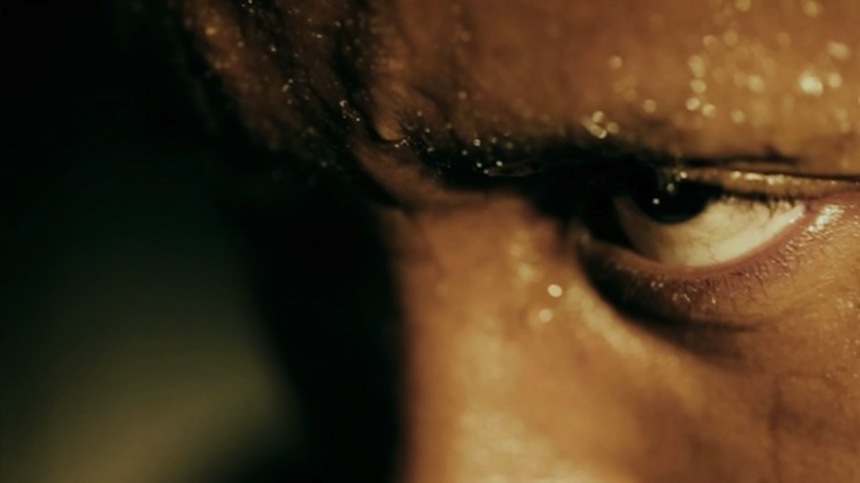TIFF 2013 Review: iNUMBER NUMBER Brings Reservoir Dogs To South Africa

Sweating men, decaying industrial wasteland and corruption of all stripes are all front and center in iNumber Number, an esoteric name for a movie that is all other respects is tight as drumskin. Consider it Reservoir Rats, only replace Tarantino's sharp dialogue with a more pragmatic pidgin of Zulu and English. In place of flourished monologues, the wow-factor here is the assured editing and gritty cinematography on display. Even the subtitles on this film scurry around the frame to dwell in shadowy spaces. Though this is Donovan Marsh's fourth feature film none of the previous three appear to be crime pictures making this a calling card for the world to take notice.
An opening sequence involving undercover cop, Chili (the outstanding S'dumo Mtshali) in a warren of shacks being guided by his uniformed partner, Shoes. Cops and robbers alike, everyone here has a nickname. Chili has two bullets in the gun he has grabbed from the first 'rat' (here slang for gangster) he has taken down. Shoes has no firearm, as his is in the shop for repair. The cops are so underfunded Shoes doesn't have a replacement gun. Instead, armed with a cellphone and sharp eyes, Shoes guides Chili through the maze of perspiring men with automatic weapons to successfully make their collar. It is a tour de fucking force that will be excellently remixed in the film's lengthy climax making it clear that Donovan captured and invented his own signature style of action cinema. As kinetic genre discoveries go at TIFF, it is what 7 Cajas was for the 2012 festival, and Nuit Blanche was the year before that.
After their superior refuses to give the two policeman their bonus for their successful risky job (politics and nepotism, naturally) it is back to the drawing board for Chili, who is looking for some of the finer things, and Shoes, who has a pregnant wife at home. Chili works another less official assignment that might allow for him to take down the bad guys and skim some corrupt money off the top. Shoes has doubts about this approach, for reasons of both risky heist and simple integrity that cops don't commit robbery, even while undercover. Chili tries to work things both ways and finds himself in a very Mr. Orange situation as the gang he infiltrates plans a daylight heist of an armoured truck. Suspicion continues to revolve around cellular phones and walkie-talkies. The gangsters aren't very smart, but they are big on action, and their Laurence Tierny-esque boss of bosses, Mambane, is a bit suspicious of all of them.
The gang includes colourfully monikered Seaside Stakes, Cheese Girl, G8, Skroef, Moses, and Dex. All achieve their own personality through their actions - in the midst of which Shoes is captured and held hostage - the heist itself, and Chili's ever-escalating moral crisis. Not interested in any sort of social message or cultural landmarks of South Africa, iNumber Number confirms that there is one thing common, at least in the movies, around the world: Crime does not pay.
As for action, there is plenty of it in the final winner-take-all rat and mouse shoot out in an abandoned factory that is reminiscent of Verhoeven's Robocop (which is explicitly, if slyly referenced by a line of dialogue early on). Much like this film's opening sequence, there exacting attention paid to geography and space, and walking the audience through it at a pace that is both tense and exhilarating is one of the chief pleasures here. At times, one feels that the uneasy camera, which often hides behind barriers or slowly tracks around obstacles, is another character in itself. Watching S'dumo Mtshali literally sweat his way out of several impossible situations, the rivulets running down his face, throat and arms in essence baptizing him a new man, is entertainment of the highest order. I'm still scratching my head over the title, though.
As for action, there is plenty of it in the final winner-take-all rat and mouse shoot out in an abandoned factory that is reminiscent of Verhoeven's Robocop (which is explicitly, if slyly referenced by a line of dialogue early on). Much like this film's opening sequence, there exacting attention paid to geography and space, and walking the audience through it at a pace that is both tense and exhilarating is one of the chief pleasures here. At times, one feels that the uneasy camera, which often hides behind barriers or slowly tracks around obstacles, is another character in itself. Watching S'dumo Mtshali literally sweat his way out of several impossible situations, the rivulets running down his face, throat and arms in essence baptizing him a new man, is entertainment of the highest order. I'm still scratching my head over the title, though.

Do you feel this content is inappropriate or infringes upon your rights? Click here to report it, or see our DMCA policy.






